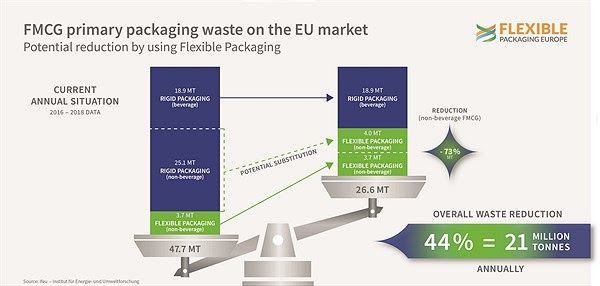A recently updated and extended study by the Institute for Energy and Environmental Research (ifeu), commissioned by Flexible Packaging Europe (FPE), has underlined the original study’s findings. It shows clearly that flexible packaging is a more effective route to resource efficiency and reducing carbon footprint than using rigid packaging formats or focusing entirely on recycling.
The study uses a scenario in which all non-flexible packaging (i.e. rigid packaging) for Fast Moving Consumer Goods (FMCG) are substituted by flexible packaging wherever possible. As carbonated drinks cannot be packed this way, for the purpose of the study, theoretical substitution excluded all beverages (as a conservative approach).
It showed that, by substituting all rigid packaging of non-beverage FMCG at the EU level, the amount of primary packaging waste could be reduced by 21 million tonnes per year. This means a 70% reduction of the total amount of non-beverage FMCG primary packaging in the EU, highlighting the huge packaging waste prevention potential of flexible packaging.
Even more striking are the consequences on the environment. By using a life cycle assessment (LCA) approach the study shows that such a theoretical substitution would decrease total Global Warming Potential (GWP) of all European non-beverage FMCG primary packaging by 33%, even if it is assumed, for the purpose of the demonstration, that no material recycling processes for flexible packaging would take place.
The opposite scenario – the substitution in the EU of all flexible packaging used for non-beverage FMCG by rigid packaging formats – would increase total GWP of the primary packaging to about 30%, the study shows. This is despite the much higher actual recycling rates of rigid packaging. Indeed, even if the recycling rate of rigid packaging was raised to 100%, this theoretical substitution would still lead to 14% higher GWP, it says.
In addition to GWP, the environmental impact of Abiotic Depletion, which refers to the use of non-renewable resources, and Use of Water have also been assessed using the LCA approach. The study shows very similar results in the same order of magnitude for all three impact categories.
The report’s authors conclude that for packaging the focus should not be on recyclability only but also and foremost on prevention. This can be achieved by a higher use of flexible packaging, which would lead not only to less primary packaging waste, they claim, but also to lower carbon footprint and use of resources.
Conversely, a focus only on recyclability and achieving recycling targets might lead to the substitution of flexible packaging solutions by more easily recyclable, rigid packaging. This approach would clearly be detrimental for climate change and resource efficiency, besides running counter to the objective enshrined in the EU Packaging and Packaging Waste Directive to prevent the production of packaging waste.
Commenting on the study, Jean-Paul Duquet (Director Sustainability FPE) said, “Prevention is on top of the waste hierarchy defined by the European Commission’s Waste Framework Directive, before other approaches like reuse, recycling and energy recovery. The priority accorded to prevention before recycling is highly relevant for packaging, as this study demonstrates. Flexible packaging perfectly fulfils this prevention requirement and proves to be a major part of the solution to today’s challenges facing the packaging sector and the environment. Not to mention the important ongoing efforts to reach high recyclability performances and make flexible packaging even more resource efficient.”
Source : Flexible Packaging Europe Media Release
Packaging 360 is a comprehensive knowledge sharing ecosystem for the Indian packaging industry. Our services include an online content platform to deliver news, insights and case studies; organising conferences seminars and customised training; Providing Bespoke Project Consulting, Market Research and Intelligence.







